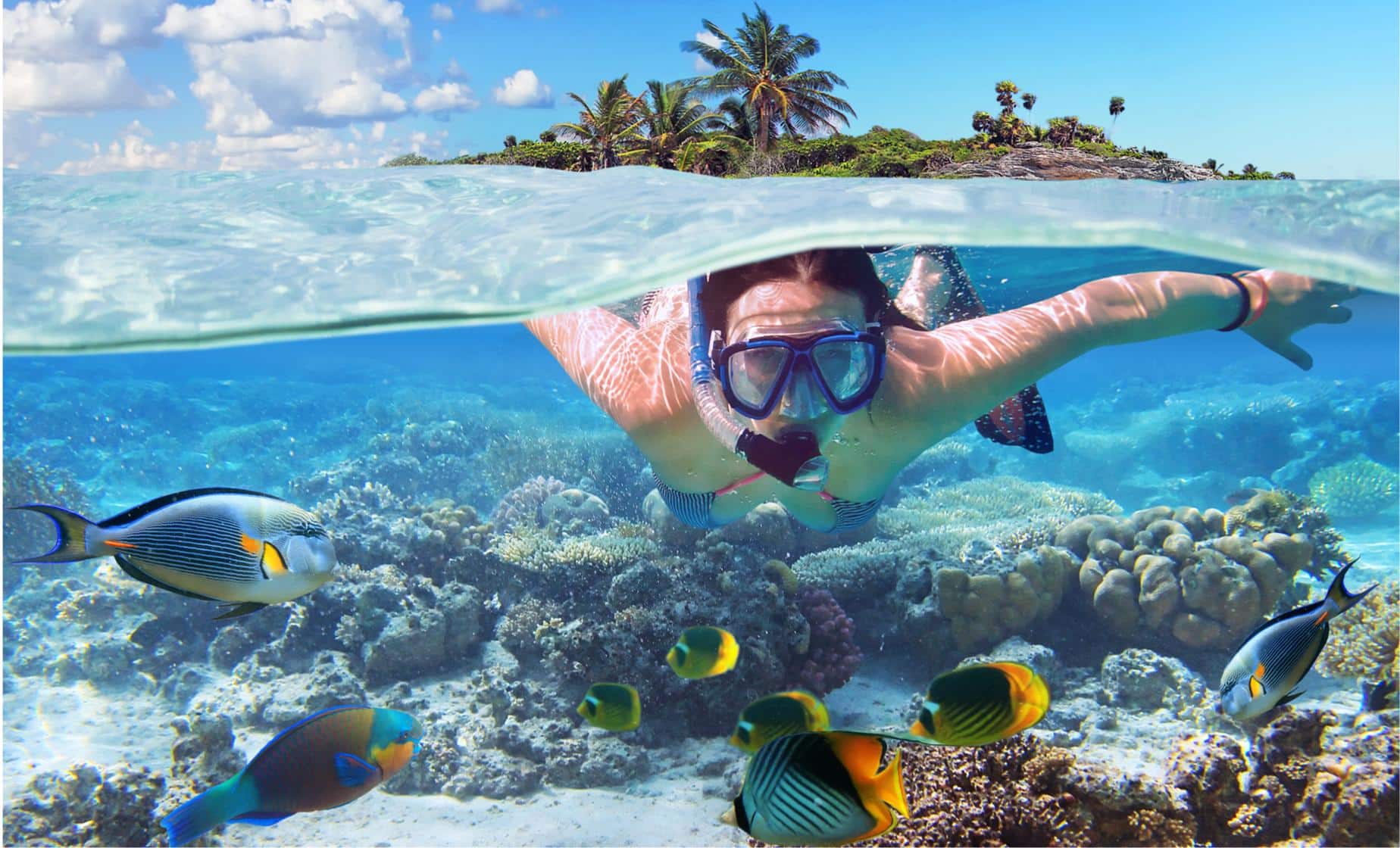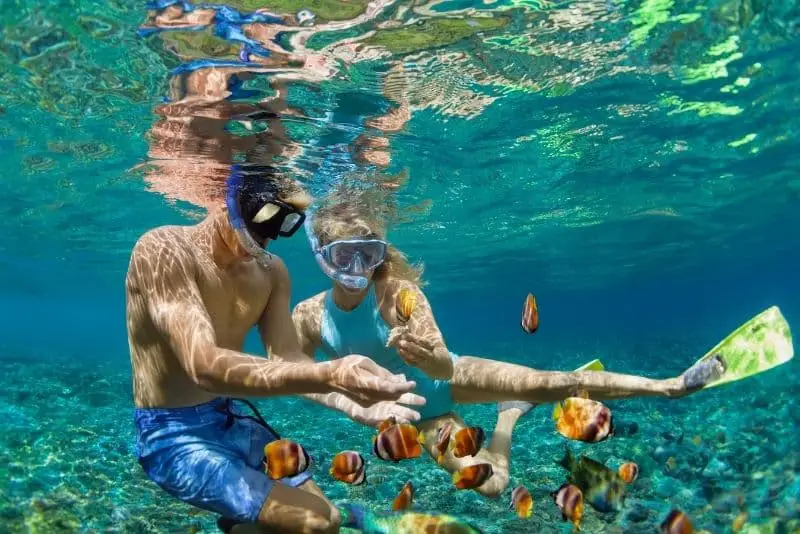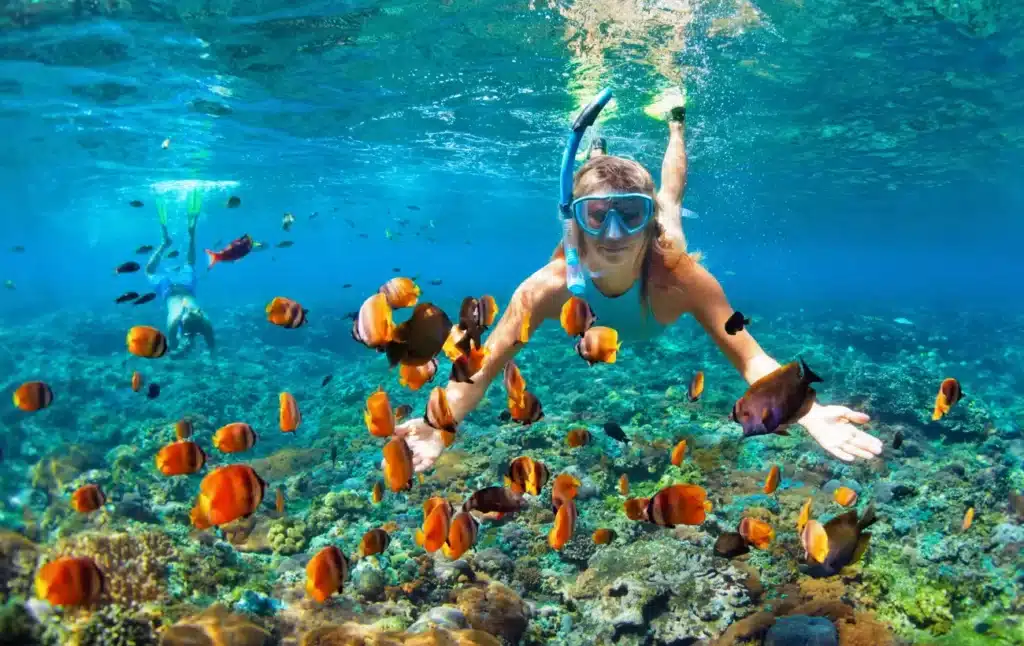Is Aruba Good For Snorkeling

Introduction
Is Aruba Good For Snorkeling: Aruba, a gem nestled in the southern Caribbean, is renowned for its pristine beaches, clear turquoise waters, and a vibrant underwater world that beckons snorkeling enthusiasts from around the globe. As you embark on your aquatic adventure in Aruba, you’ll quickly discover why this island paradise is considered one of the best destinations for snorkeling in the Caribbean.
Aruba’s unique geographical position and its dedication to marine conservation have fostered an environment teeming with marine biodiversity. The island’s coastline is dotted with numerous snorkeling sites, each offering a distinct and mesmerizing experience. Whether you’re a novice or an experienced snorkeler, Aruba has something to offer everyone.
Aruba’s underwater world is a kaleidoscope of color, with vibrant coral formations, sponges, and an array of fish species. You might encounter parrotfish, angelfish, and even the elusive seahorse while exploring the coral gardens. The visibility in Aruba’s waters is consistently excellent, often exceeding 100 feet, ensuring that you won’t miss any of the breathtaking underwater sights.
In addition to natural beauty, Aruba is home to various snorkeling tour operators and guides who can enhance your experience with their knowledge of the best spots and local marine life. Many of these tours include stops at secluded beaches, ensuring a well-rounded day of adventure.
Beyond its incredible underwater wonders, Aruba’s year-round warm climate and friendly locals make it an ideal destination for snorkeling enthusiasts. So, whether you’re seeking relaxation, adventure, or a bit of both, Aruba’s vibrant snorkeling scene promises an unforgettable journey beneath the waves.

Does Aruba have good snorkelling?
Snorkeling in Aruba is a popular pastime because of the island’s clear and calm waters, which offer ideal conditions for snorkeling—you can often see as far as 100 feet, and waves and currents are quite minimal.
Aruba is renowned for offering exceptional snorkeling experiences. Its clear, warm Caribbean waters are home to a rich and diverse marine ecosystem, making it a prime destination for underwater enthusiasts. The island’s numerous snorkeling sites cater to all levels of expertise, from beginners to advanced divers.
One of Aruba’s standout snorkeling spots is the Antilla Shipwreck, a sunken WWII German freighter that rests in relatively shallow waters. This mesmerizing site provides a unique opportunity to explore history while encountering a variety of marine life.
Aruba’s coral reefs are another highlight, featuring vibrant and healthy formations teeming with colorful fish, sponges, and other fascinating creatures. Popular locations like Baby Beach and Mangel Halto are perfect for families and novices due to their calm, shallow lagoons.
What sets Aruba apart is its consistent water visibility, often exceeding 100 feet. This ensures that snorkelers can fully appreciate the underwater wonders even at greater depths. Moreover, the island’s commitment to marine conservation ensures the long-term sustainability of these precious ecosystems.
Aruba’s combination of stunning underwater landscapes, accessibility, and marine biodiversity make it an undeniable paradise for snorkeling. Whether you’re a seasoned snorkeler or a first-timer, Aruba’s aquatic world promises an unforgettable and awe-inspiring adventure beneath the waves.
What is the best month to snorkel in Aruba?
September can also be the best time to visit Aruba for snorkeling, thanks to lighter winds that can keep surface waves at bay. And, though tour operators will often reduce the number of outings per week, you may find yourself in a smaller group and waiting in fewer lines than you might during peak season.
The best month to snorkel in Aruba largely depends on your personal preferences and what you hope to experience during your underwater adventure. Aruba’s consistently warm and tropical climate makes it a year-round snorkeling destination. However, there are a few factors to consider when choosing the ideal month for your snorkeling trip.
If you’re looking to avoid crowds and enjoy more affordable accommodations, the shoulder seasons of late April to early June and September to November are also great options. Although there might be occasional rain showers during these periods, the snorkeling conditions remain favorable, and you’ll likely encounter fewer tourists.
It’s important to note that Aruba’s sea temperature remains warm throughout the year, making snorkeling comfortable regardless of the season. Ultimately, the best time to snorkel in Aruba depends on your priorities, whether it’s ideal weather, fewer crowds, or budget considerations.
Is snorkeling better in Aruba or Bonaire?
There really is no comparison between the two. The snorkeling in Aruba is fine if you are on the island for all the other things it has to offer. However if you are looking for specifically a snorkeling vacation, your best bet is to spend the extra $$ and head to Bonaire.
When comparing snorkeling experiences between Aruba and Bonaire, it’s important to understand that both Caribbean islands offer exceptional underwater adventures, but they have some key differences to consider.
Aruba, with its numerous snorkeling sites along its western and southern coasts, is known for its accessibility and variety. The island boasts an array of snorkeling spots suitable for all levels, including the famous Antilla Shipwreck and picturesque coral gardens. Aruba’s consistent warm climate and clear waters make it a year-round snorkeling destination, ideal for families and beginners. It’s also worth mentioning that Aruba has a more developed tourism infrastructure, offering a wide range of accommodations, dining options, and activities beyond snorkeling.
On the other hand, Bonaire, often considered a diver’s paradise, also offers excellent snorkeling opportunities. Bonaire’s marine park regulations have contributed to the protection of its coral reefs and abundant marine life. Snorkelers in Bonaire can explore pristine coral formations and enjoy encounters with various fish species.
Ultimately, the choice between Aruba and Bonaire for snorkeling depends on your skill level, preferences, and the type of underwater experience you seek. Both islands offer unique and memorable snorkeling adventures in the stunning waters of the Caribbean.
What makes good snorkeling conditions?
In most locations, snorkeling in the morning is best because the waters are calmer and the winds are fairly smooth and calm. Many experts believe that the ideal snorkeling conditions exist when you have a gentle westerly wind, warm water, and a low tide.
Good snorkeling conditions depend on several key factors that contribute to a safe and enjoyable underwater experience. These factors include:
- Water Clarity: Excellent visibility is crucial for snorkeling. Clear water allows snorkelers to see marine life, coral formations, and underwater features with ease. Factors like minimal sediment, calm seas, and absence of pollution contribute to clear water conditions.
- Water Temperature: Snorkeling is most comfortable in warm waters. Tropical and subtropical destinations often offer the ideal water temperature, ensuring you can stay in the water for extended periods without discomfort.
- Marine Life and Coral Health: Healthy coral reefs and abundant marine life are essential for a rewarding snorkeling experience. Vibrant coral formations attract a diverse range of fish and other underwater creatures, making the underwater world come alive.
- Minimal Currents: Gentle or predictable currents are preferred for snorkeling, as strong currents can make it challenging to control your movements and maintain your position while observing marine life.
- Safety: Safety considerations, such as proximity to boat traffic, lifeguards, and emergency equipment, contribute to good snorkeling conditions. Safety measures ensure a worry-free experience in the water.
- Accessibility: Easy access to snorkeling sites, whether from the shore or by boat, is a key factor. Convenient entry and exit points make it more convenient to explore underwater.
- Weather Conditions: Calm weather, with minimal wind and rain, is important for safe snorkeling. Adverse weather conditions can affect water clarity and surface conditions.
What are the best hours to snorkel?
The Best Time To Go Snorkeling
Most experienced snorkelers would agree that morning is ideal for this particular pursuit. Because there is much less wind early in the day than at any other time, the water is usually much calmer.
The best hours to snorkel largely depend on the location and local marine life patterns. In coastal areas with clear waters and vibrant coral reefs, early morning is often considered optimal. During this time, the sun is not yet at its zenith, casting a gentle, angled light that illuminates the underwater world in its full splendor. Additionally, the winds tend to be calmer in the early hours, ensuring a smoother and more enjoyable snorkeling experience.
Conversely, some marine ecosystems come alive in the late afternoon. As the day progresses, certain species of fish and marine creatures become more active, creating a dynamic and bustling underwater environment. In such cases, late afternoon to early evening may be the preferred snorkeling window.
Tides also play a crucial role. Many snorkelers prefer to explore the underwater realm during high tide, as it provides deeper waters and allows access to areas that may be shallow or inaccessible during low tide. However, some prefer low tide for its calm and clear conditions.
Ultimately, the best hours to snorkel are a combination of personal preference, local knowledge, and understanding the unique rhythms of the marine life in the chosen area. It’s a dance between the sun, the tides, and the creatures of the sea, ensuring each snorkeling adventure is a memorable and enriching experience.
What marine life can I expect to see while snorkeling in Aruba?
Snorkeling in the crystalline waters of Aruba promises an enchanting encounter with a diverse array of marine life. The island’s underwater world is teeming with vibrant and colorful creatures, making it a haven for underwater enthusiasts. Expect to be greeted by an array of tropical fish species, including the striking parrotfish, resplendent in its kaleidoscopic hues, and the elusive trumpetfish, known for its slender, elongated form.
Aruba’s reefs also play host to mesmerizing coral formations, where brain, elkhorn, and staghorn corals create a living tapestry of shapes and colors. Keep an eye out for the gentle sway of sea fans and the intricate architecture of sea anemones, providing refuge for a variety of marine creatures.
Venturing a bit deeper, lucky snorkelers might chance upon graceful eagle rays gliding through the azure depths, while schools of playful squid and octopuses may reveal themselves in a mesmerizing ballet of movement. If you’re particularly fortunate, you might even encounter the docile nurse shark, a fascinating denizen of Aruba’s coastal waters.
Snorkeling in Aruba offers a front-row seat to a vibrant marine spectacle, where every fin and tentacle contributes to a thriving underwater symphony of life. It’s an experience that leaves a lasting imprint, etching the memory of Aruba’s aquatic wonders forever in the minds of those fortunate enough to explore its depths.
Is snorkeling in Aruba suitable for beginners?
Absolutely, snorkeling in Aruba is highly suitable for beginners. The island offers a range of snorkeling spots with calm, clear waters and shallow depths, making it an ideal environment for those new to the activity. Baby Beach, for instance, is renowned for its gentle, shallow lagoon, providing an excellent starting point for novices to get comfortable with snorkeling gear and techniques.
Moreover, Aruba boasts numerous guided snorkeling tours led by experienced instructors. These professionals are adept at providing instruction, ensuring safety, and offering support to individuals of all skill levels, including beginners. They often select locations that are conducive to learning, with minimal currents and abundant marine life to observe.
Aruba’s exceptional visibility underwater ensures that even beginners can enjoy stunning views of the vibrant coral reefs and tropical fish without having to venture too deep. With a bit of guidance and practice, newcomers to snorkeling can quickly gain confidence and become immersed in the breathtaking underwater world that Aruba has to offer.
Aruba’s snorkeling scene is not only accessible but also welcoming to beginners. With the right guidance and a willingness to explore, novices can embark on a memorable underwater adventure in one of the Caribbean’s most captivating destinations.
Are there any safety tips for snorkeling in Aruba?
When snorkeling in Aruba, adhering to essential safety guidelines is paramount to ensure a memorable and secure underwater experience. Firstly, always choose reputable snorkeling operators or guided tours with certified instructors. They possess local knowledge and are equipped to handle emergencies, providing an extra layer of safety.
Before entering the water, check your equipment for proper fit and functionality. Ensure your mask creates a watertight seal, your fins fit snugly, and your snorkel allows easy breathing. Familiarize yourself with the location’s specific conditions, including potential currents or underwater hazards.
It’s crucial to conserve your energy and never overexert yourself while snorkeling. Practice controlled breathing to conserve oxygen and prevent hyperventilation. Additionally, maintain a comfortable and relaxed body position in the water, minimizing unnecessary movements.
Always snorkel with a buddy or in close proximity to a lifeguard or instructor. This ensures there’s someone available in case of any unexpected situations. Additionally, establish a communication signal to alert your partner or guide if you encounter any difficulties.
Respect the marine environment by avoiding contact with corals or marine life. Touching or standing on corals can cause irreparable damage to these delicate organisms. Lastly, regularly monitor your surroundings and be aware of your position relative to the shore or boat, ensuring you don’t drift too far.
By adhering to these safety tips, you’ll not only enhance your snorkeling experience in Aruba but also contribute to the preservation of its precious marine ecosystems.

Conclusion
Aruba undoubtedly stands out as an exceptional destination for snorkeling enthusiasts. Its crystal-clear waters, diverse marine life, and numerous snorkeling sites make it a haven for underwater exploration. The island’s commitment to marine conservation ensures that the coral reefs remain healthy and vibrant, providing a breathtaking backdrop for your aquatic adventures.
Aruba caters to all levels of snorkelers, from beginners to experienced divers. Whether you prefer tranquil lagoons, captivating coral gardens, or the intrigue of exploring a sunken shipwreck, Aruba’s snorkeling options are as diverse as they are captivating. The ease of access to these sites and the excellent visibility in Aruba’s waters make it an inviting destination for anyone eager to discover the wonders beneath the waves.
Moreover, Aruba’s warm and welcoming atmosphere, combined with the expertise of local snorkeling guides, adds a layer of comfort and excitement to your snorkeling experience. The island’s pristine beaches, vibrant culture, and superb hospitality create a well-rounded vacation destination for those seeking more than just underwater adventures.
So, whether you’re drawn to Aruba for its extraordinary snorkeling opportunities, its idyllic beaches, or its vibrant culture, one thing is certain: Aruba’s underwater world is a treasure trove waiting to be explored. It’s a place where the wonders of the Caribbean Sea come to life, leaving indelible memories and a deep appreciation for the beauty of our oceans. Aruba is, without a doubt, a paradise for snorkeling enthusiasts and nature lovers alike.



